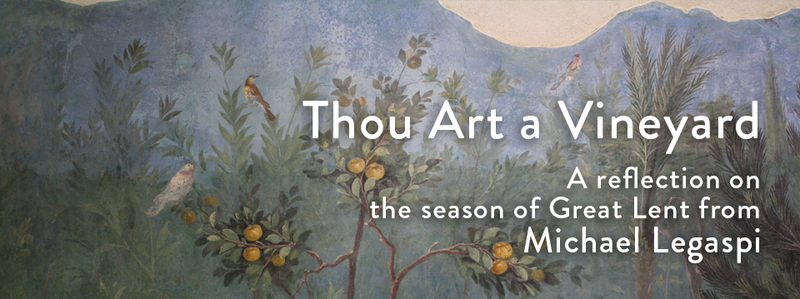Thou Art a Vineyard - Michael Legaspi
Posted by SVS Press on 5th Mar 2024
Thou Art a Vineyard:
A reflection on the season of Great Lent from St Vladimir’s Orthodox Theological Seminary Associate Professor of Old Testament, Michael Legaspi
Last year, in the middle of Great Lent, a women’s chorale here at the Seminary put on a concert of hymns to the Theotokos.
Among the many beautiful pieces, one stood out to me: the renowned medieval Georgian hymn “Shen Khar Venakhi,” known also as “O Vineyard Fair and New.” The words, here in translation, are simple and stunning:
O Vineyard fair and new, ever freshly blooming.
Young, comely, fragrant Stem, springing out of Eden.
May God Himself adorn you who are most honored.
For you, O brilliant Sun, ever shine with unwaning light.
As I listened to the hymn, I felt a perilous joy. I sensed briefly a truth, a reality toward which we move in our Lenten journey. The hymn evokes spring, but it does not speak merely of a season of the year. Rather, the hymn concerns “spring” as it truly is. Trees and vines do indeed blossom in the spring, and, to our delight, the sun seems to regain a brilliance dulled and shaded by winter’s gray. Yet this change of season is not the true spring.
There I was, in the midst of Lent, preoccupied with the discomforts and difficulties of the season: the challenge of longer and more frequent services, the myriad injustices of a vegan diet, prostrations on end. As I listened to this song about a vineyard, I realized, with pain, that I was not one—far from it. I am a desolate patch of hard soil, all stones and briar. Lent was, is painful to me in the way that the work of an excavator is painful to a plot of rocky ground.
But what happens when one belongs, without thought of self, to the Lord of the vineyard? Such a one, though old and full of scars, may become fair and new. Though stale and soiled by sin, this one becomes comely and fragrant. The aim of Lenten labors, I sensed suddenly, was not to complete a training program or, worse, to check off religious boxes. Instead, the aim is to return to Eden and grow there. In belonging fully to God, Mary became Eden, in which was planted the Tree of Life. She is the true spring.
Though the hymn is unimaginably tender and sweet, there is peril in it. We read in Scripture of other vineyards (Isaiah 5.1–7; Matthew 20.1–16), and we are warned against our own capacity to reject justice, live for ourselves, and run riot in the vineyard of the Lord. Lent reminds us of divine judgment. Yet there is another peril as well. It is the danger we feel when we realize that things can be otherwise: in place of sin’s familiar, well-worn paths, God calls us to true life, which is unaccountably real, strong, and, as we see in the Theotokos, beautiful.
Despite the fact that Annunciation, one of the great feasts of the Theotokos, almost always falls during Lent every year, I do not usually reflect on the example of the Mother of God during Lent, as one might during Nativity or Dormition. Yet the timing of last year’s concert caused me to see both the peril and the beauty of Great Lent and to understand, further, that the two are strangely alike. In her beauty, the Mother of God shows us how strong Love is that breaks the earth, wounds the heart, and conquers Death.
Great Lent Reading list from Dr Michael Legaspi
Alexander Schmemann
Olivier Clément
Alexander Elchaninov
- PPS 19, On the Mother of God (second print)
Jacob of Serug; Mary Hansbury, trans.




